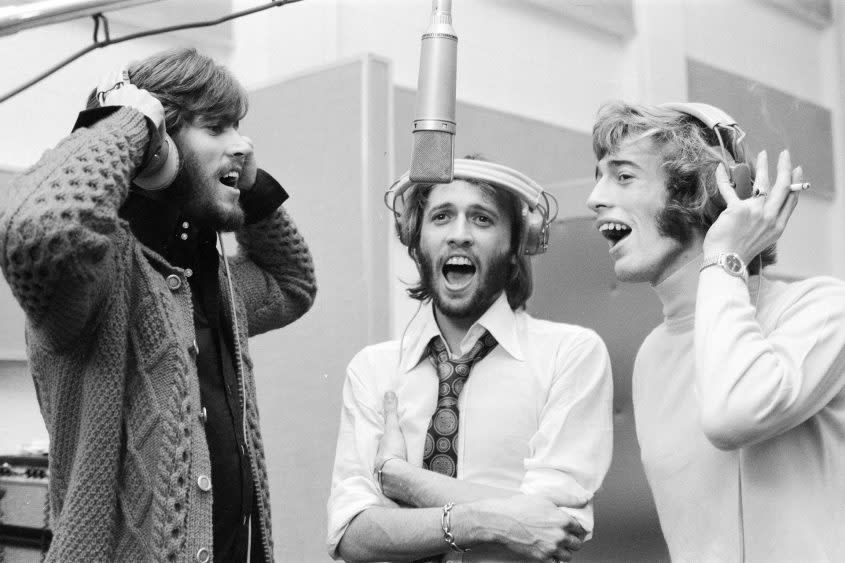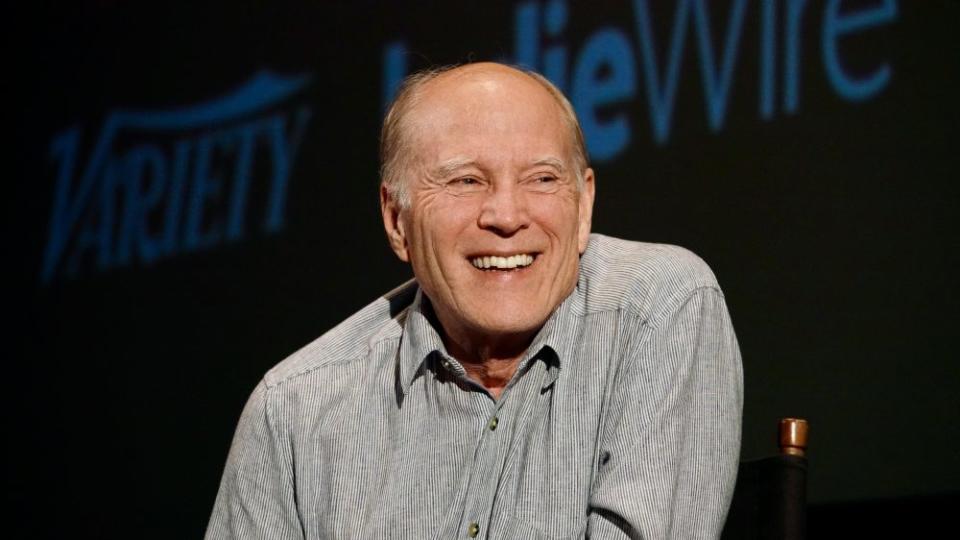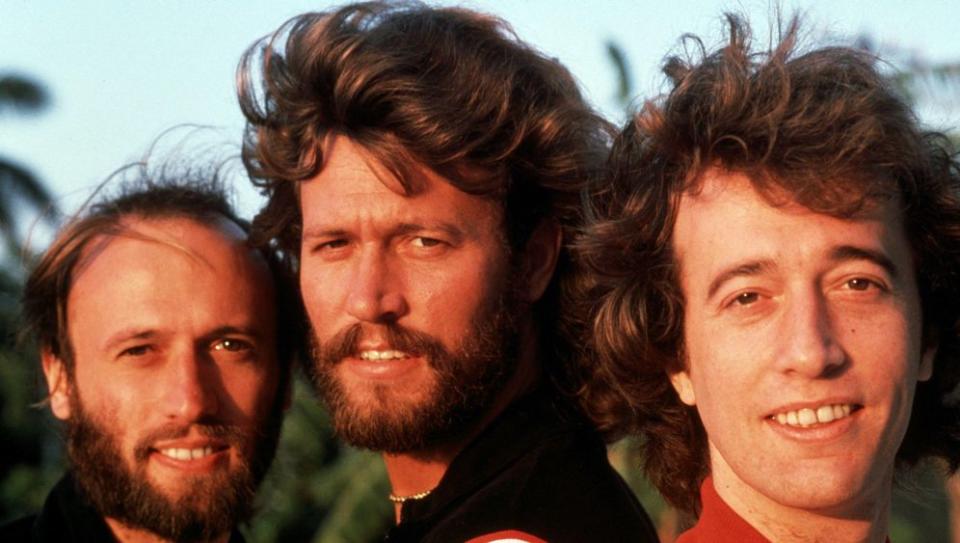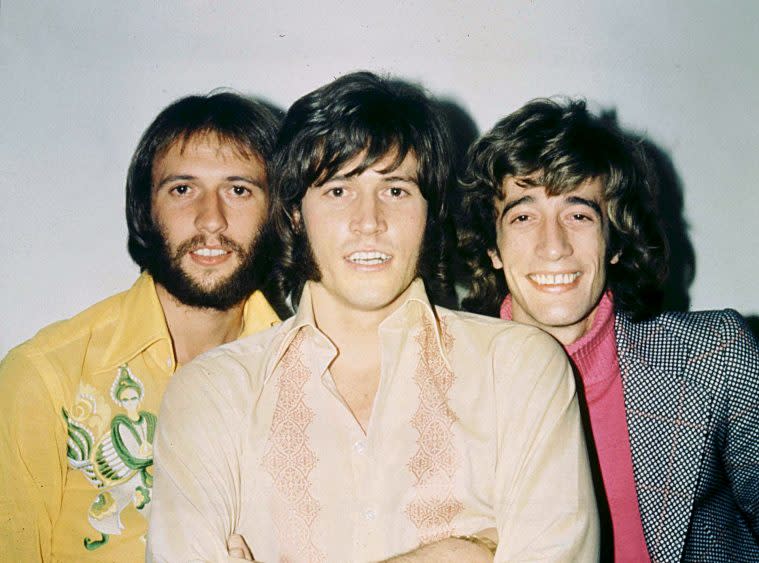No Jive Talking: Emmy-Nominated Filmmaking Team Drops Truth On ‘The Bee Gees: How Can You Mend A Broken Heart’

The Bee Gees sang in such beautiful three-part harmony that it’s tempting to assume the relationship between the brothers—eldest Barry, and his two younger brothers, twins Robin and Maurice—was just as harmonious.
But the HBO documentary The Bee Gees: How Can You Mend a Broken Heart, nominated for six Emmys including Outstanding Documentary or Nonfiction Special, shows that while there was always great love between the siblings, at times there was significant friction.
More from Deadline
“It’s a musical story,” notes filmmaker Frank Marshall, Emmy-nominated for directing and producing the film, “but it’s also a story about this family.”
It’s a family with more chart success and record sales than almost any other group. The Bee Gees first emerged on the music scene in the 1960s, with big grins, big teeth, and particularly in the case of Barry, big hair.
“All of us had the same understanding,” Barry recalls in the film, “that we were going to be famous come hell or high water.”

Daily Mirror/Mirrorpix via Getty Images/HBO
It was the big talent that elevated them, both for singing and songwriting: “To Love Somebody” (1967), “Massachusetts” (1968), “How Can You Mend a Broken Heart” (1971), “Jive Talkin’” (1975), “Nights on Broadway” (1975), “You Should Be Dancing” (1976), “Love So Right” (1976), “How Deep Is Your Love” (1977), “Stayin’ Alive” (1977), “Too Much Heaven” (1978), “Tragedy” (1979), not to mention all the hits they wrote for other artists.
“The sweetest voices you’ve ever heard,” says Mark Monroe, nominated for producing and writing the documentary. “Sadly, [their gift] is taken for granted… Working on this film you get the full catalog and you kind of immerse yourself. It’s hard to put into words how affected I was at the start of this, because I knew almost every song by heart… They’re so infectious.”
Robin’s high vibrato characterized the group’s early sound, as in 1967’s “I Started a Joke.” But he and Barry shared primary vocals on the 1968 hit “I’ve Got to Get a Message to You.” The film explores the tensions that grew between Robin and Barry over who’s voice would predominate; each of the brothers wanted solo careers and in 1969 Robin announced his intention to quit the Bee Gees.
Sibling dynamics are something Marshall could identify with.

Courtesy of Matthew Carey
“I come from a musical family. I’m also the oldest,” he comments. “I have two younger brothers. We had a band together in the ’60s for about 10 minutes. I was really curious as to how Barry negotiated that as being the oldest.”
The brothers eventually patched things up, with Maurice playing peacemaker between Robin and Barry as needed, and the Bee Gees went on to their greatest success in the late ‘70s. The soundtrack to Saturday Night Fever (1977) remains one of the biggest albums of all time. With it, the Bee Gees became synonymous with disco. And then came the backlash.
“They didn’t want to be labeled as a disco band, because they were constantly using a whole variety of different musical styles,” Marshall says. “They kind of got blamed for it, disco music… They didn’t know what hit them… They couldn’t get played on the radio.”

HBO
The film illustrates how record companies opportunistically—and unwisely—pumped out dreadful disco songs to capitalize on the music’s popularity, thereby triggering the “Disco sucks” backlash.
“Once disco became commercial, these companies saw they could make money,” Marshall observes, “and they just destroyed the genre.”
But the documentary also suggests the disco backlash may be understood as anti-Black and anti-gay, because the music had emerged from Black and gay nightclub scenes.
“Suddenly, you see the cultural aspect of it,” Marshall comments. “That’s what I love about making a documentary, is that you can find these new directions to go in, that you never knew and then you can follow.”

Courtesy of Matthew Carey
Monroe admits, “I had this anguish working on this film. It’s like, why did my brother have a “Disco sucks” t-shirt [back then]? It’s bizarre. It makes you look at the turning points of the culture in a new way.”
The association with disco arguably still keeps the Bee Gees from being properly appreciated. But the Marshall Plan and the Monroe Doctrine was to interview musicians and record producers of today who understand the astounding achievements of the brothers. Chris Martin, Noel Gallagher of Oasis, songwriter and producer Mark Ronson, Justin Timberlake, Nick Jonas, and Eric Clapton are among the figures who heap praise on the group.
“A hundred percent of our interview wishlist said, ‘Yes,’” Marshall says. “Because they were inspired and they knew how brilliant the group were that had this tremendous impact on them and their development—certainly, you talk to Nick Jonas and to Noel, they have the family dynamic as well. They all wanted to talk about it. It was fantastic.”
Marshall and Monroe also interviewed Barry Gibb extensively in Florida, where he lives. Now 74, he’s the only surviving Gibb brother. Andy, the youngest sibling, also died the youngest, at age 30 in 1988. He had a solo music career and was set to formally join the Bee Gees before his untimely death from a heart ailment exacerbated by drug use. Maurice died in 2003 and his twin brother Robin followed him in 2012.

HBO/South Coast Press/Shutterstock
“Barry was very, very gracious and humble,” Marshall tells Deadline. “There was some sadness there because he truly misses his brothers and it’s really obvious when he talks about it. He was reflective and as he says in the movie, these are just his memories.”
“A lot of times documentary subjects are kind of adamant that this is the story, the story I’m telling you is the story,” Monroe adds. “Barry, right off the bat, wanted to make sure we understood that it’s only his version of events. I thought that was so generous to his brothers, that he wanted to make sure we found a way to get what they thought had happened, not just what he thought.”
Best of Deadline
Fox Fall Premiere Dates: 'Masked Singer', '9-1-1', Animation Domination, Three New Series & More
Broadway Returns: A Complete, Updated Roster Of Opening Dates, Venues And How To Buy Tickets
U.S. Covid-19 Update: More Transmissible Delta Variant Now 20% Of New Cases; Kids Most At Risk
Sign up for Deadline's Newsletter. For the latest news, follow us on Facebook, Twitter, and Instagram.

